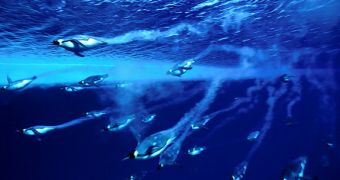This is the champ diver of the birds' world, not just the largest penguin. A new study, published in the "Journal of Experimental Biology", attempts to decode the secret of why emperor penguins can dive down to 1,850 ft (565 m) for up to 23 minutes (with an average of 6 minutes) with a sole breath: a special hyper-sensitive type of hemoglobin.
Some beaked whales can dive to 1,900 m (6,300 ft) depths for 85 minutes, but these are huge mammals, over 10 m (33 ft) long and weighing tons, while these penguins do not overpass 34 kg (75 pounds).
The new investigation showed that these Antarctic penguins returned from long fishing divings with the lowest blood oxygen levels ever recorded in wild animals: they consumed virtually all of their oxygen deposits in their respiratory system and blood, when other species would have experienced severe hypoxia.
Most species (humans included) cannot completely consume the oxygen in their lungs, not even when they cannot breathe, because their hemoglobin cannot pick up and transport oxygen in low concentrations, while this penguin hemoglobin seems to be extra-sensitive, squeezing the last oxygen molecules in the birds' breathing system, carrying it to the main oxygen requiring organs (brain and heart).
"We hypothesize that the emperor can store more oxygen in its blood due to different binding properties of its hemoglobin. This would allow it to use its lung oxygen completely and would also provide a greater oxygen content at low oxygen pressures so that there is no tissue damage", said lead author Paul Ponganis, of the Scripps Institution of Oceanography in San Diego, California.
Emperor penguins have to dive deep in search of their favorite preys, lanternfish and squids. The species adapted, increasing its ability to store oxygen and control its consumption level.
"For example, higher concentrations of hemoglobin and the blood protein myoglobin allow emperor penguins to store about 2.5 times more oxygen per unit of body mass than humans", Ponganis noted.
These diving birds also plummet their heart rate to just five beats per minute on long dives, even when chasing fish, for oxygen preservation.
"If we can understand why a diving animal does not incur tissue damage when exposed to low oxygen levels and low blood flow, [we may gain] a better understanding of how such damage occurs in humans and how it might be prevented", Ponganis said.
The research team made its experiments with wild birds at the Penguin Ranch research facility on McMurdo Sound (Antarctica). The researchers drilled diving holes into the thick ice layer far away from other openings, so that the investigated individuals had to return to the same point after fishing dives. Tiny sensors were implanted inside their air sacs, sending data on the oxygen levels to special recorders attached to the birds' backs.

 14 DAY TRIAL //
14 DAY TRIAL //